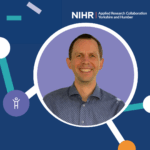The West Yorkshire Scientific Advisory Group (WYSAG) is hosted and facilitated by the NIHR Applied Research Collaboration (ARC) Yorkshire and Humber on behalf of the West Yorkshire Combined Authority and West Yorkshire Health and Care Partnership (WYHCP).
WYSAG brings together academic expertise and available research to give independent evidence-based policy advice by mobilising, organising and utilising available research and evidence. This advice seeks to consider issues from a health, economic, environmental, inclusion and equity perspectives with a focus on joint topics identified by the Combined Authority and Health and Care Partnership that are relevant to policy.
Applied health research expertise from the ARC is aligned with contributions from other disciplines such as economics and the environment via the Yorkshire & Humber Policy Engagement & Research Network (Y-PERN) and Yorkshire Universities through WYSAG.
WYSAG aims to:
• Be policy and practice driven
• Be systematic, rapid and responsive
• Collate, appraise and synthesise existing research evidence
• Be advisory
• Formulate interdisciplinary advice set in the local context
Within West Yorkshire and the wider Yorkshire and Humber region there is a wealth of research and academic assets which could inform policy development. Through WYSAG we hope to harness these resources to help make our region a healthier and happier place for families to live.
WYSAG Briefings
WYSAG Briefings provide details of the topic areas and associated findings / reports that the group has been exploring on behalf of the Combined Authority and Health and Care Partnership. They also include ideas from research which could help deliver the missions of the West Yorkshire Plan.
Flexible Working – Inequalities in access and experience in the UK
Creating a healthier economy is a key economic and public health challenge. Flexible Working – defined as the level of influence and control that people have at work over work scheduling practices, such as where, when and how much work is carried out to meet their wellbeing needs – is one potential way of achieving this. This includes influence and control over practices such as remote or home working, working compacted hours, or over shift patterns and rostering. This WYSAG rapid review explored the UK evidence base in how different groups of employees (e.g. by occupation, disability, ethnicity, gender) access or experience flexible working arrangements, including in relation to health and wellbeing, and the inequalities experienced.
The potential of food systems to contribute to the West Yorkshire Plan
Embedding food into regional policy and investment has the potential to positively contribute to West Yorkshire’s ambitions. This briefing produced by Fix Our Food identifies how transforming food systems could contribute to the five missions set out in the West Yorkshire Plan.
WYSAG Talks
The WYSAG Talks series provides the chance to find out more from WYSAG experts about the big challenges facing us, what the science tells us and what we can do to together to build a healthier future in West Yorkshire.
Pollution: What’s the problem by Rosie McEachan
In this WYSAG Talks video Prof. Rosie McEachan describes the impact of pollution on our populations health and explores the solutions of how urban and transport planners can work with health and education providers and communities to tackle the issue of pollution.
Improve Livelihoods to create a robust & resilient economy and society by Kate Pickett
In this WYSAG Talks video Prof Kate Pickett explains research focusing on identifying interventions and policies which can reduce economic inequalities and tackle health disparities.
An evidence-based approach to addressing the school absence crisis by Mark Mon-Williams
In this WYSAG Talks video Prof Mark Mon Williams describes an evidence-based approach to addressing the school absence crisis. School aged children school (aged 4-16 years) are identified as being a “persistent absentee” if they are recorded as having 90% attendance or less over the course of at least one academic year.
For more information, please see the paper in the link here: https://royalsocietypublishing.org/do…
For full report, click the link here: Call for new era of school inclusion and belonging as attendance crisis report warns children in the North and children with SEN are more likely to be persistently missing school — Centre for Young Lives
Fixing our school food system by Prof Maria Bryant
In this WYSAG Talks video Prof Maria Bryant describes the research being done with families, young people and local authorities to provide a clear evidence base for policy makers to improve the school food system.
Healthy streets: How where we live, work, and socialise shapes our life outcomes by Professor Laura Vaughan
In this WYSAG Talks video, Laura Vaughan, Professor of Urban Form and Society at the UCL Bartlett School of Architecture, explores how our environment shapes our health outcomes and why place matters more than we think.
Reference:
Act Early Primer: How can local government protect and promote health and well-being during the cost of living crisis?





